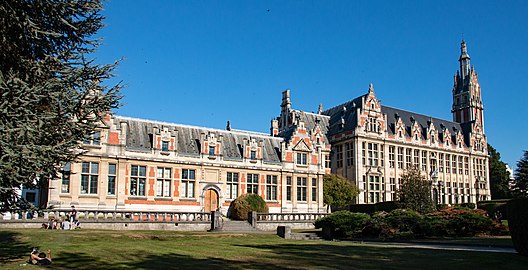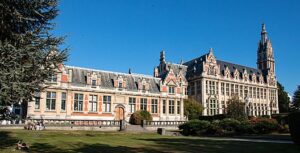Founded in1834, the Université libre de Bruxelles (ULB) is apublic-funded independent research university with several campuses located inand around the Belgian and European capital, giving researchers and a30,000-strong student body (headcount 2019) every opportunity to embrace allthe perks of this vibrant international city.
ULB offersabout 40 undergraduate programmes and nearly 250 graduate courses. Easilyaccessible by train from several major European cities in under two hours, ULB’sstudent intake is about one-third international with 20 per cent coming fromEurope. Although it is a French-speaking institution, international studentscan take advantage of university language courses to improve their French andan increasing number of Master’s programmes are taught in English. ULB hasstrong links with international institutions in Brussels and works closely withthe Vrije Universiteit Brussel, its sister Flemish-speaking University alsobased in the capital.
Theuniversity’s more relevant than ever philosophy focuses on the idea of freedomof inquiry and ULB is renowned for its debate culture and for its commitment toall progressive causes. ULB, in particular, is still at the forefront of thefight for women’s rights and for reproductive rights in Belgium. Its governingbodies, staff and student organisations are also very active in local andinternational debates around migration, academic freedom and sustainabledevelopment. Its internal democracy has students represented on decision-makingbodies at all levels.
ULB’s Latinmotto can be translated as “conquering darkness with knowledge” and itsscholars have won a variety of awards including four scientific Nobel prizes,24 Francqui Prizes (a Belgian scholarly award), and a Fields Medal. ULB’salumni network is present all over the World.
Founded in1834, the Université libre de Bruxelles (ULB) is apublic-funded independent research university with several campuses located inand around the Belgian and European capital, giving researchers and a30,000-strong student body (headcount 2019) every opportunity to embrace allthe perks of this vibrant international city.
ULB offersabout 40 undergraduate programmes and nearly 250 graduate courses. Easilyaccessible by train from several major European cities in under two hours, ULB’sstudent intake is about one-third international with 20 per cent coming fromEurope. Although it is a French-speaking institution, international studentscan take advantage of university language courses to improve their French andan increasing number of Master’s programmes are taught in English. ULB hasstrong links with international institutions in Brussels and works closely withthe Vrije Universiteit Brussel, its sister Flemish-speaking University alsobased in the capital.
Theuniversity’s more relevant than ever philosophy focuses on the idea of freedomof inquiry and ULB is renowned for its debate culture and for its commitment toall progressive causes. ULB, in particular, is still at the forefront of thefight for women’s rights and for reproductive rights in Belgium. Its governingbodies, staff and student organisations are also very active in local andinternational debates around migration, academic freedom and sustainabledevelopment. Its internal democracy has students represented on decision-makingbodies at all levels.
ULB’s Latinmotto can be translated as “conquering darkness with knowledge” and itsscholars have won a variety of awards including four scientific Nobel prizes,24 Francqui Prizes (a Belgian scholarly award), and a Fields Medal. ULB’salumni network is present all over the World.
Sorry, no records were found. Please adjust your search criteria and try again.
Sorry, unable to load the Maps API.
Bruxelles
Bruxelles
Belgium

